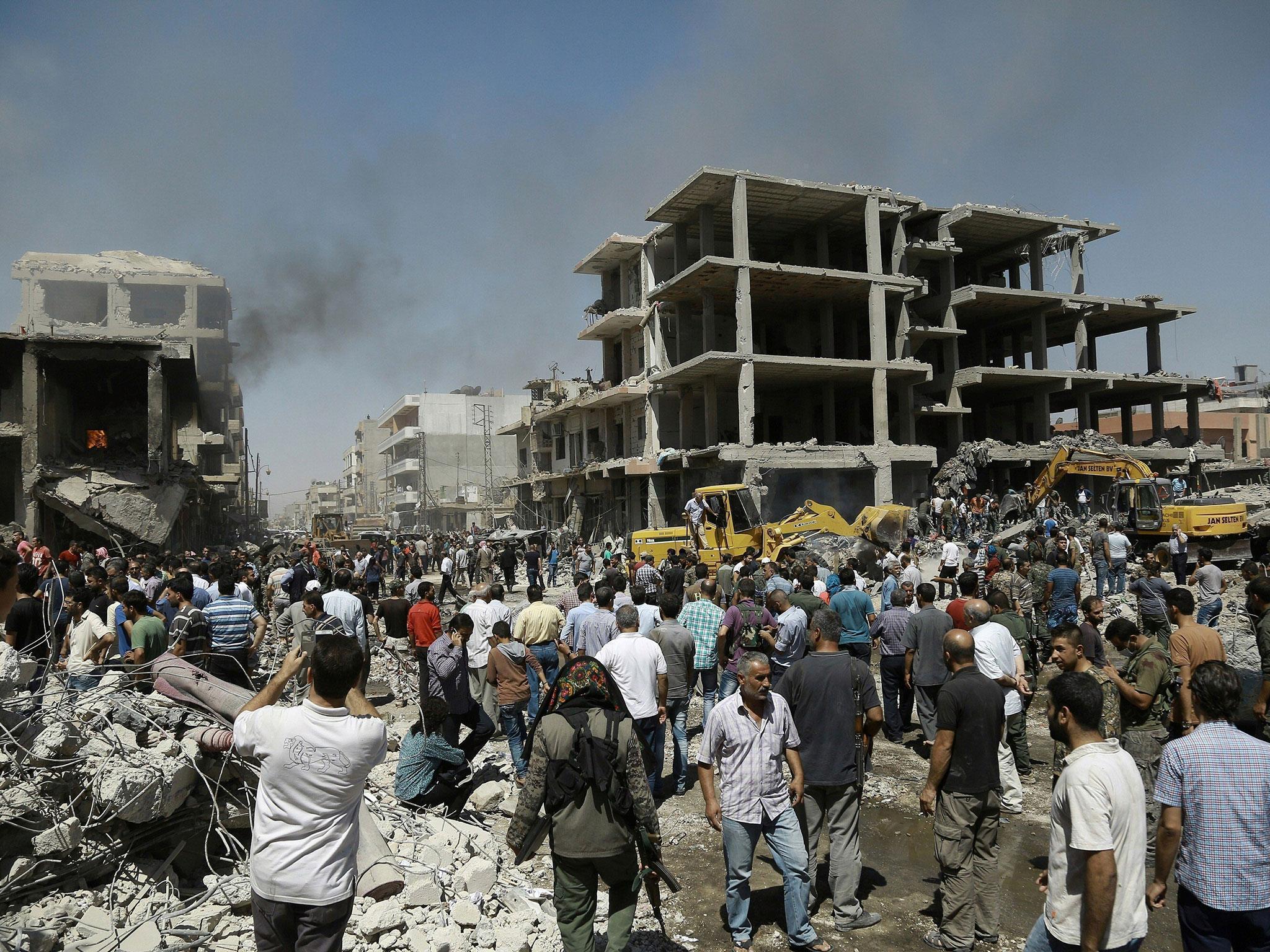Isis bombs kill dozens in Kurdish city of Qamishli as extremist group faces becoming surrounded
The Kurds' YPG is one of the most effective military forces fighting against Isis in Iraq and Syria

Your support helps us to tell the story
From reproductive rights to climate change to Big Tech, The Independent is on the ground when the story is developing. Whether it's investigating the financials of Elon Musk's pro-Trump PAC or producing our latest documentary, 'The A Word', which shines a light on the American women fighting for reproductive rights, we know how important it is to parse out the facts from the messaging.
At such a critical moment in US history, we need reporters on the ground. Your donation allows us to keep sending journalists to speak to both sides of the story.
The Independent is trusted by Americans across the entire political spectrum. And unlike many other quality news outlets, we choose not to lock Americans out of our reporting and analysis with paywalls. We believe quality journalism should be available to everyone, paid for by those who can afford it.
Your support makes all the difference.Isis has carried out two bombings in the predominantly Kurdish city of Qamishli in the Syrian Kurdish enclave in north east Syria, killing 44 people and injuring over 100. The explosions tore apart a security headquarters along with government ministries in what may have been Isis retaliation for a Kurdish-backed offensive that threatens to seal off the self-declared caliphate from the outside world.
A truck packed with explosives blew up on the western side of Qamishli, which is the de facto capital of the Kurdish controlled zone, and this was followed with the explosion of a bomb on a motorcycle. Rescue teams are working to find people under the rubble. “It was a massive explosion,” local journalist Idris Ali told the Kurdish news agency Rudaw. “The bang was heard across Qamishli. Every hospital is receiving the wounded.”
The Syrian Kurdish zone stretches from the Tigris to the Euphrates River across northern Syria just south of the Turkish border. Its People’s Protection Units (YPG) receive close air support from US planes, greatly increasing their firepower and enabling them to advance south and west since 2012, when the Syrian Army largely abandoned the area. The Army has some troops in Qamishli controlling the airport and a limited sector in the city.
The YPG is one of the most effective military forces fighting in the war that is being waged in Iraq and Syria, establishing effective check points at which documents and loads are carefully scrutinised. But, if suicide bombers are intercepted, they normally blow themselves up at the checkpoints, inflicting heavy loss of life among security forces and those waiting to pass through. However, although the enclave known to Kurds as Rojava, stretches a long way east to west, Isis forces are not far to the south and have in the past penetrated into Kurdish cities and towns to carry out bombings and killings. In June 2015 an Isis detachment of about 80 entered the Kurdish city of Kobani west of Qamishli and killed at least 220 civilians and 35 YPG fighters before being killed themselves.
Qamishli resident and writer Suleiman Youssef was quoted as saying that he heard the first explosion from a few miles away. He said the blasts levelled several buildings and many people were trapped under the rubble. “Most of the buildings at the scene of the explosion have been heavily damaged because of the strength of the blast,” he said.
One motive for the bombing may be that an offensive by the YPG-backed Syrian Democratic Forces (SDF) is fighting its way into the town of Manbij west of the Euphrates, which has been held by Isis for two years. If it falls, this will cut off Isis from the one place where they can gain access to Turkey and the outside world. It would also cut off the movement from the heavily populated and highly fertile land of northern Aleppo, that has a population of about 600,000. The SDF says that it gave Isis fighters time to leave the town, but they have not taken advantage of the offer.
The Syrian Kurds, numbering about two million or 10 per cent of the population, were a marginalised and persecuted minority up to 2011, when they threw off Syrian government control, only to find themselves under attack from the Syrian branch of al-Qaeda, the Nusra Front, and later Isis. The reason the Kurds are so militarily effective is that PYD, the party running the enclave, is the Syrian of the Kurdistan Workers Party (PKK) which has fighting a guerrilla war against the Turkish army since 1984.
Isis is under pressure in both Iraq and Syria and has responded with a string of massacres through carefully organised bombings in Baghdad, where 292 people were killed at the end of Ramadan, and another in the Syrian government heartlands at Tartous and Jableh. Attacks on civilians has always been a central part of Isis tactics to show strength and defiance as well as to sow fear. Another aim is to tie down security forces defending potential civilian targets.
Subscribe to Independent Premium to bookmark this article
Want to bookmark your favourite articles and stories to read or reference later? Start your Independent Premium subscription today.
Join our commenting forum
Join thought-provoking conversations, follow other Independent readers and see their replies
Comments